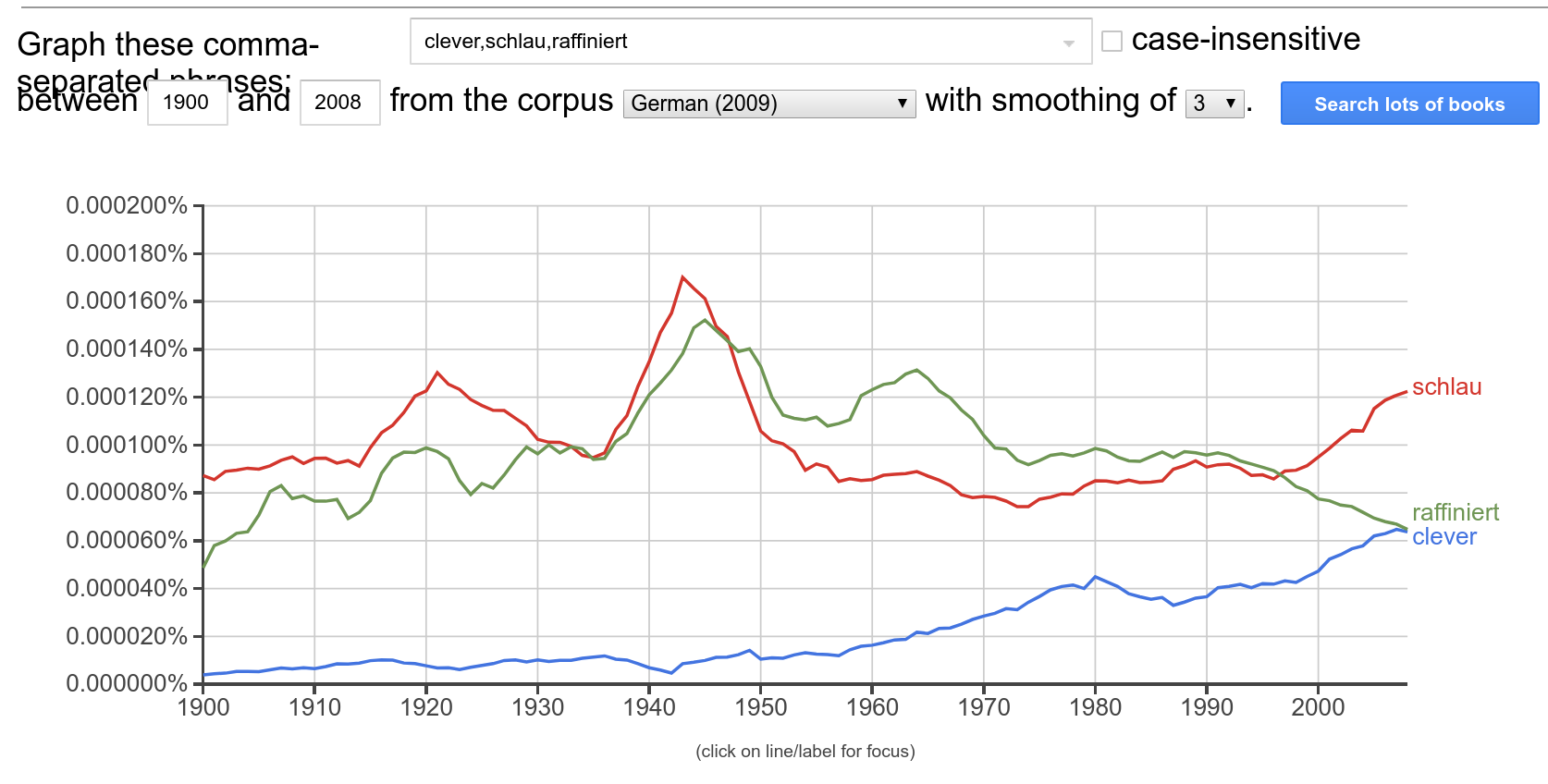How common is the word "clever" in German these days? I hear it used everywhere, as if it's a native word. Also, Google NGrams shows a steady incline in use for phrases like "sehr clever" ever since the seventies.
But my trustworthy (if increasingly ancient) German dictionary doesn't have it as a lemma.
So, is this considered a proper German word these days? If so, when did it become an actual loanword rather than something foreign?
-
By the way, you can answer in German if you like. I can read German just fine, I just cant write it. (Zuviel Fehlern!)– Mr ListerCommented May 9, 2018 at 16:52
-
It is used in modern german just like a Lehnwort. But we have a lot of Anglicisms adopted, even some that don't even exist like "handy" for "mobile phone" or "cell phone" :-D.– πάντα ῥεῖCommented May 9, 2018 at 16:58
-
Note that clever has a slightly different notion in German from the English one, tending more towards being whizzy than pure cleverness, knowledge and intelligence.– tofroCommented May 9, 2018 at 19:35
3 Answers
So, is this considered a proper German word these days? If so, when did it become an actual loanword rather than something foreign?
In living and lively german language, there are a lot of Anglicisms used all day.
With spoken or even written language.
IMO that ultimately started, after some campaigns the national socialist party failed to keep out "undeutsche Sprache" from the every day spoken language with loosing the war, and all their faces.
It's always a bit hard to tell when exactly a loanword was adopted with the language.
Nevertheless the terms clever or smart are well adopted and still in use (not like a temporary fashion, and of course no pun intended here).
-
I remmeber clever fro times when Anglicisms were not yet as big a thing as today ... but that may also be caused by clever & smart Commented May 9, 2018 at 18:57
-
Bei clever bin ich einverstanden, bei smart weiß ich nicht, ob die neudeutsche inflation aller möglichen 'smarten' Geräte anhalten wird. Bei ein smarter Typ / Bursche hab ich keine genaue Vorstellung, was smart hier bedeuten soll; früher dachte ich, das bezieht sich aufs Aussehen und dachte an einen Typ wie Tom Selleck oder Burt Reynolds, inzwischen weiß ich nicht, ob damit nicht doch soziale Geschicklichkeit oder Liebenswürdigkeit oder irgendeine schwer definierbare Talentiertheit gemeint sein soll. Aus irgendeinem Grund mag ich das Wort nicht. Für verbreitet halte ich es nicht. Commented May 12, 2018 at 10:55
-
-
@πάντα ῥεῖ: Ich hatte das für ne Fernsehserie gehalten. Aber da seh ich's wieder: Obwohl ich gerne Comics gelesen hatte, wäre ich nie auf die Idee gekommen, Clever & Smart zu lesen, das wär mir zu viel hausbacken gewesen, sowohl vom Zeichenstil her als auch mit seinem rustikal-schlichten 'Humor'. Commented May 12, 2018 at 11:54
-
Ein teilweise geeignetes Werkzeug, die Popularität von Sprachgebrauch zu untersuchen, ist Googles NGram:
Google NGram (clever, schlau, raffiniert)

Man kann mehrere Wörter, etwa wie hier Alternativen, vergleichen, den untersuchten Zeitraum eingrenzen (älteste Dokumente reichen für "schlau" bis 1750 zurück). Im Hinterkopf ist zu behalten, dass die Suche auf Büchern, die Google vorliegen, beruht, also Briefe, Zeitungen, Flugblätter und andere Schriftformen nicht umfasst sowie keine mündliche Rede. Die Texte sind auch von OCR-Software erfasst und nicht kontrolliert, was bei älteren Texten in Frakturschrift (häufig vor 1940) häufig zu Fehlern führt.
Der Graph zeigt die Häufigkeit von Ausdrücken in Proportion zur Wortproduktion des jeweiligen Jahres, d.h. steigende Flanken sind nicht dadurch zu erklären, dass die Buchproduktion in der Phase zugenommen hat.
Clever not very common in German, but widely understood. The only people who are using it excessively are advertising firms and people hearing too many ads, I think.
Smart is even less common, it's only used in combinations as Smartphone and Smart Home. There's also the product brand Smarties, and I bet a lot of Germans asks themselves what the connection is.
